高中英语12年级空中课堂-基于语篇的议论文篇章结构分析-1
浅谈基于文本结构特点的高中英语阅读教学

浅谈基于文本结构特点的高中英语阅读教学1. 引言1.1 背景介绍Introduction:Background IntroductionIn recent years, there has been an increasing focus on the importance of text structure in high school English reading teaching. Text structure refers to the way in which a text is organized and the relationships between its different parts. Understanding text structure can greatly enhance students' comprehension and analysis of a text, as well as their ability to extract key information and main ideas.The teaching of text structure in high school English is crucial for several reasons. Firstly, proficiency in understanding text structure is essential for students to successfully navigate complex academic texts and exams. Secondly, an awareness of text structure can help students to identify the main ideas and key supporting details in a text, enabling them to better summarize and analyze the information presented. Finally, an understanding of text structure can also facilitate students'ability to produce well-organized and coherent written responses.Overall, the importance of text structure in high school English reading teaching cannot be overstated. By incorporating a focus on text structure into our teaching methodologies, we can help students to become more skilled and confident readers and writers.1.2 研究意义研究意义:高中英语阅读教学是英语教育过程中的重要环节,对学生的语言能力和学术水平有着重要影响。
高中英语12年级空中课堂-基于语篇的议论文篇章结构分析-2
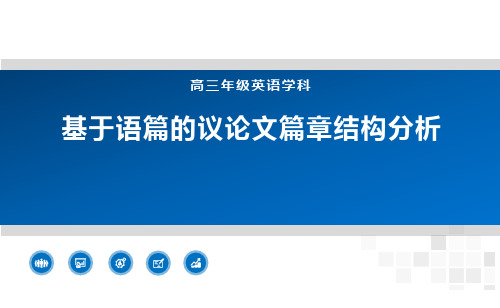
2020年西城区一模D篇
① The Impossible Burger is entirely free of meat. But it looks, smells, feels and— most importantly—tastes so much like real hamburger beef. In fact, plant-based burger alternatives have set off a strong resistance from the beef industry. The Center for Consumer Freedom, a nonprofit that advocates on behalf of the fast food and meat industries has launched an “informational” campaign targeting plant-based meats. The campaign has included TV and online ads, as well as print ads in newspapers. The ads seem to imply that not only is an artificial burger too processed, but that it might be even less healthy than the average beef burger.
2020年西城区一模D篇
②While it’s true that a plant-based meat alternative is processed and it’s true that eating one is not as healthy as a pile of raw vegetables, it’s best to take the ads with a generous pinch of salt. ③For instance, the additives and preservatives in plant-based meat highlighted in one ad sure sound scary. Who wants something called titanium dioxide (二氧化钛) in their meal? But the truth is that additives such as those listed in the ads are regularly used in all sorts of packaged foods. And if methylcellulose, a food thickener, sounds unpleasant, it’s really nothing compared with salmonella (沙门菌) poisoning you can get from regular meat.
高中英语12年级空中课堂2020朝阳一模机读Part1(语填+完型)

其他出题点
其他出题点
02
完型填空 (12,13,18,23,28)
完型填空
审标题:Gidda’s Team
主要内容:本篇主要讲述Malik是学校足球队的队长,他们需要筹钱换新的球衣。但是教
练并帮不上什么忙。他在和奶奶Gidda交流的时候突然想到一个好点子--卖无花果蛋糕。最 终他们筹够了足够的钱去买新的球衣。而奶奶Gidda也被邀请去观看他们的比赛并被封为— Team Grandmother.
2020朝阳一模
机读部分解读
Part1 1 2
语法填空 完型填空
01 语法填空(1,10)
语篇分析及考点分布
语篇分析:记叙文,说明文,记叙文
考点 时态语态
非谓语
从句
介词 名词 连词
题号 3,(过去时)
1,(不定式)
4,(一般现在时) 2, (过去分词)
10,(现在分词)
5,(定语从句) 6(from) 9,(wisdom) 7,(But) 8,(状语从句)
12.A.allow B. enjoy C. consider
D. mind
At dinner, Mama asked Malik, “How’s your 15 with the coach?” Unwillingly, Malik said, “It’s just team stuff.” Changing the 18 , Malik turned to Gidda. “Do you want to go sit outside after dinner?”
现在分词和only to do 作结果状语的区别: 1. He did his homework carelessly, making a lot of mistakes. (自然而然的或者必然的一个结果) 2. He hurried to the station only to find the train had gone. (意想不到的结果)
高中英语12级 空中课堂-第3课时-英语中三大从句的功能辨析-2(1)
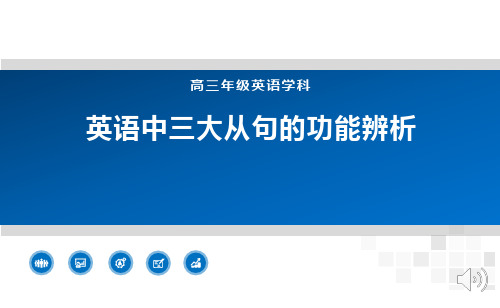
不管什么样子的whatever
3. The poor young man is ready to accept __________________ help he can get.
4. --What a mess! You are always so lazy! --I'm not to blame, mum. I am _什__么_(_人_)_w_h_a_t you have made me.
2. The shocking news made me realize __w__h_a_t __ a terrible problem we would face.
3. The shocking news made me realize __w__h_a_t __ terrible problems we would
3. Up to now there have been different explanations for ____w__h_y_____ natural selection makes autumn colors so widespread 名从: 宾语从句
4. The reason we were late is ____th_a_t______ there was an accident on the road. 名从: 表语从句
第三步: 若无需补充并列连词, 那么必定要填主从复合句的连接词
浅谈基于语篇的高中英语阅读分层教学

浅谈基于语篇的高中英语阅读分层教学高中英语阅读教学一直是教学中的重点和难点。
学生在高中阶段需要大量的阅读训练来提高他们的阅读理解能力和阅读水平。
而语篇是高中英语阅读教学中的重要一环,因此基于语篇的高中英语阅读分层教学成为了当前教学中的一种重要方法。
本文将就基于语篇的高中英语阅读分层教学进行探讨和分析。
一、语篇在高中英语阅读教学中的重要性语篇是高中英语阅读教学中的主要内容之一。
语篇是指在一定的语言环境下,用语言符号进行的能够表达完整意义的交际性语言单位。
语篇可以是一段话、一篇短文或一篇文章。
语篇具有完整性、连贯性和目的性,是进行有效交际的基本单位。
在高中英语阅读教学中,语篇的选择和利用对于学生的阅读能力的培养和提高具有重要的意义。
语篇能够提供学生真实的语言运用环境。
语篇是从生活中摘取出来的,具有真实性和实用性。
通过阅读语篇,学生能够更深入地了解英语语言的实际运用情况,增加对语言的感知和理解。
语篇能够提供学生丰富的语言信息。
语篇中包含了丰富的词汇、语法和语言表达方式,通过阅读语篇,学生不仅能够获得新的语言知识,还能够丰富自己的语言表达能力。
语篇能够促进学生的交际能力。
语篇是为了交际目的而编写的,它能够引导学生学会使用语言进行交际,提高他们的口语表达和书面表达能力。
语篇在高中英语阅读教学中的重要性在于它能够提供真实的语言环境、丰富的语言信息和促进交际能力,对于学生的阅读能力的培养和提高具有重要的帮助。
基于语篇的高中英语阅读分层教学是一种针对学生不同阅读水平和需求的教学方法。
这种教学方法能够更加有效地提高学生的阅读理解能力和阅读水平,具有重要的意义。
基于语篇的阅读分层教学能够促进学生的阅读兴趣。
这种教学方法能够根据学生的实际情况和需求,选择适合其阅读水平的语篇进行教学,使学生在阅读中感到轻松愉快,从而增加阅读的兴趣和积极性。
基于语篇的阅读分层教学能够促进学生的自主学习能力。
这种教学方法能够激发学生的学习兴趣,让学生在阅读过程中不断思考和探索,培养他们的自主学习和思维能力。
高中英语12年级空中课堂-基于语篇的写作语言质量提升-1纯PPT(1)

参考修改: 1. After this activity, I went back home and felt exhausted. 2. After returning home, I was aware of the hardship of farmers.
(1) Our plan succeeded. Confidence is the key to success.
(2) He started to applaud and the others joined in. The audience broke into thunderous applause.
(5) What he has done is against the law. She is against seeing him.
常见错误2:时态混用(Tense Disagreement)
观察 1. First, we helped the owner of a farm plant trees. Second, we feed the animals. 2. Besides, farmers also introduce some knowledge about agriculture to us. Through
注意:1.词数不少于 50; 2.开头和结尾已给出,不计入总词数。
提示词:学农 learn from farmers
典型作文分析
Dear Jim, How is it going? I am very happy to know you
are interested in our activity learn from farmers. So, I'd like to introduced it to you.
高中英语12级 空中课堂-英语中三大从句的功能辨析-1(1)
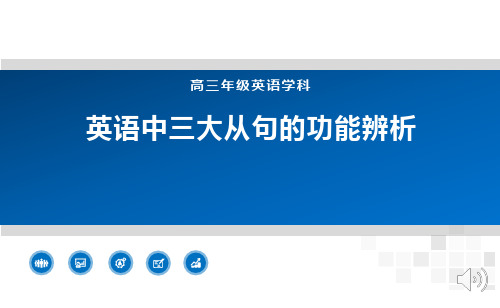
month. 5) Tom is reading in the room ___w__h_er_e_____ the others are watching TV. 6) I’ll never forget the day ____w__h_e_n____ I joined the League. 7) I don’t know the reason ____w_h_y______ she looks unhappy today.
2019二模 朝阳
定从
1
1
0
0
1
1
1
0
1
状从
0
0
0
0
0
1
0
0
0
名从
1
1
1
1
0
1
1
1
1
总题数 10
10
10
10
10
10
10
10
10
考试规律总结: 1. 在高考语法填空部分,共考查10个小题,其中包含2-3个小题聚焦主从复合句。 2. 主从复合句的考查对象,以名词性从句为主,定语从句次之,状语从句考查
频率最少。
高三年级英语学科
英语中三大从句的功能辨析
1
目录
2
CONTENTS
3
4
考查内容 考查方式 答题策略 易错点辨析
01 考查内容
高考真题及模拟题细目表
卷名 考点
2019高 考北京
基于语篇与语用知识的高中英语阅读教学
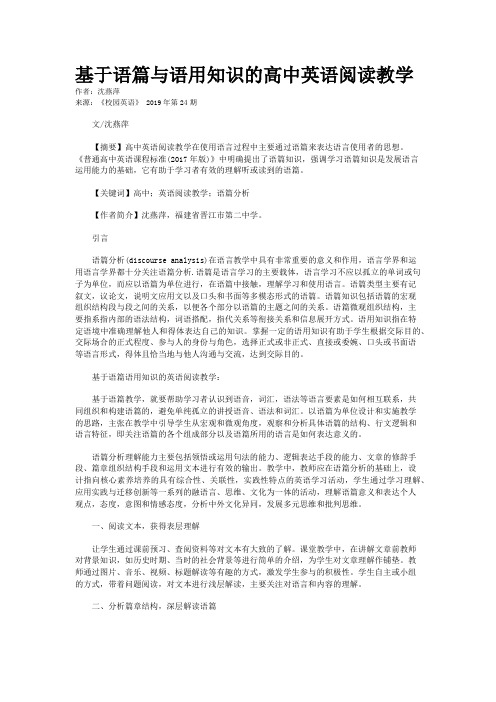
基于语篇与语用知识的高中英语阅读教学作者:沈燕萍来源:《校园英语》 2019年第24期文/沈燕萍【摘要】高中英语阅读教学在使用语言过程中主要通过语篇来表达语言使用者的思想。
《普通高中英语课程标准(2017年版)》中明确提出了语篇知识,强调学习语篇知识是发展语言运用能力的基础,它有助于学习者有效的理解听或读到的语篇。
【关键词】高中;英语阅读教学;语篇分析【作者简介】沈燕萍,福建省晋江市第二中学。
引言语篇分析(discourse analysis)在语言教学中具有非常重要的意义和作用,语言学界和运用语言学界都十分关注语篇分析.语篇是语言学习的主要载体,语言学习不应以孤立的单词或句子为单位,而应以语篇为单位进行,在语篇中接触,理解学习和使用语言。
语篇类型主要有记叙文,议论文,说明文应用文以及口头和书面等多模态形式的语篇。
语篇知识包括语篇的宏观组织结构段与段之间的关系,以便各个部分以语篇的主题之间的关系。
语篇微观组织结构,主要指系指内部的语法结构,词语搭配,指代关系等衔接关系和信息展开方式。
语用知识指在特定语境中准确理解他人和得体表达自己的知识。
掌握一定的语用知识有助于学生根据交际目的、交际场合的正式程度、参与人的身份与角色,选择正式或非正式、直接或委婉、口头或书面语等语言形式,得体且恰当地与他人沟通与交流,达到交际目的。
基于语篇语用知识的英语阅读教学:基于语篇教学,就要帮助学习者认识到语音,词汇,语法等语言要素是如何相互联系,共同组织和构建语篇的,避免单纯孤立的讲授语音、语法和词汇。
以语篇为单位设计和实施教学的思路,主张在教学中引导学生从宏观和微观角度,观察和分析具体语篇的结构、行文逻辑和语言特征,即关注语篇的各个组成部分以及语篇所用的语言是如何表达意义的。
语篇分析理解能力主要包括领悟或运用句法的能力、逻辑表达手段的能力、文章的修辞手段、篇章组织结构手段和运用文本进行有效的输出。
教学中,教师应在语篇分析的基础上,设计指向核心素养培养的具有综合性、关联性,实践性特点的英语学习活动,学生通过学习理解、应用实践与迁移创新等一系列的融语言、思维、文化为一体的活动,理解语篇意义和表达个人观点,态度,意图和情感态度,分析中外文化异同,发展多元思维和批判思维。
浅谈基于语篇的高中英语阅读分层教学
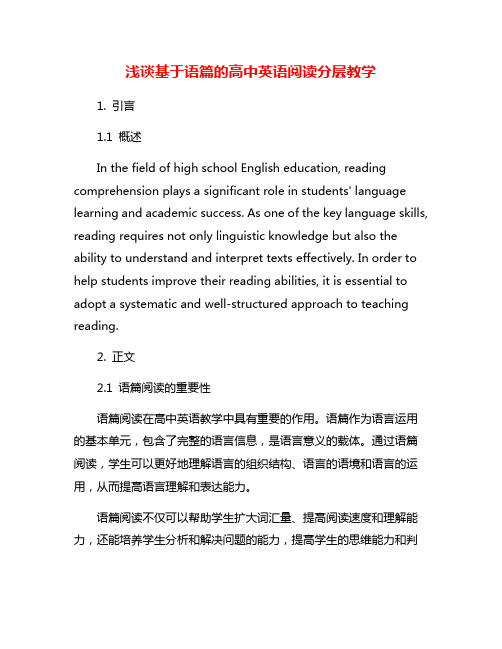
浅谈基于语篇的高中英语阅读分层教学1. 引言1.1 概述In the field of high school English education, reading comprehension plays a significant role in students' language learning and academic success. As one of the key language skills, reading requires not only linguistic knowledge but also the ability to understand and interpret texts effectively. In order to help students improve their reading abilities, it is essential to adopt a systematic and well-structured approach to teaching reading.2. 正文2.1 语篇阅读的重要性语篇阅读在高中英语教学中具有重要的作用。
语篇作为语言运用的基本单元,包含了完整的语言信息,是语言意义的载体。
通过语篇阅读,学生可以更好地理解语言的组织结构、语言的语境和语言的运用,从而提高语言理解和表达能力。
语篇阅读不仅可以帮助学生扩大词汇量、提高阅读速度和理解能力,还能培养学生分析和解决问题的能力,提高学生的思维能力和判断能力。
语篇阅读还可以帮助学生了解不同文化背景下的语言运用习惯,增进跨文化交流能力。
在高中英语教学中,要重视语篇阅读的训练,通过多样化的阅读材料和任务设计,激发学生的阅读兴趣,培养他们良好的阅读习惯。
教师可以引导学生通过阅读不同类型的语篇,如新闻报道、广告宣传、科技文章等,培养学生对不同领域知识的理解能力。
语篇阅读对于学生的英语学习至关重要。
浅谈高中英语语篇结构分析教学法

浅谈高中英语语篇结构分析教学法[摘要]语言存在于语篇之中,不是存在于单纯的句子之中。
随着外语教学的深入,人们开始认识到传统的方法已不适应培养学生的英语能力。
为了更好地理解篇章,获取信息,语篇结构分析教学因而被引入阅读教学。
[关键词]英语语篇结构语篇是语义单位或是“在某处情景中做某事”的语言。
语篇的着眼点是一个完整思想意义的篇章,一个大于句子小于语境的成分,它可以帮助我们从整体上把握文章的意义。
语篇分析教学表现在对语篇的背景知识、篇章知识、字词句知识和推理这几方面的教学。
在这一模式中,前两项是对语篇的宏观分析,后两项是对语篇的微观剖析。
在阅读教学中,首先引导学生从语篇的整体入手,分析语篇的宏观结构,其次以语篇的局部为重点,从微观上剖析语篇的篇章结构。
一、宏观结构分析语篇分析教学的第一阶段是宏观导入,主要涉及对课文背景知识、语篇结构的教学。
这一阶段旨在使学生初步了解课文的形式和内容,为以后深入理解课文打下基础。
背景知识也称世界知识,是读者理解特定语篇所必须具备的外部世界知识。
大量研究表明,如果读者不具备相关的背景知识,便无法理解语篇,背景知识对理解的影响大于语言知识。
在具体教学中,如果学生不具备相关的背景知识,教师就应提供这些知识或课前让学生查找这些知识,帮助他们理解。
如果学生具备了相关的背景知识,教师就应帮助他们充分激活这些知识,有意识地运用这些知识进行阅读活动。
这一点很重要,因为缺乏相关背景知识会造成阅读理解障碍,具备相关背景知识,但不会运用也会造成阅读障碍。
至于如何培养学生有意识地运用背景知识,我们可以采取不同的办法,如在讲解课文前,先给出标题,然后给出一些选择项目,这些选择项可能与语篇的内容有关,也可能与语篇的内容无关,让学生依据已有的背景知识判断语篇中可能出现的内容,接下来再给出小标题或段旨句,让学生对自己依据标题所作出的判断加以检验和限定。
也可以从文章中取出一些反映语篇内容的关键词汇,让学生根据这些词汇预测语篇的内容。
浅析高中英语议论文的语篇教学

通过写作使学 生更深切地体会 到某一体裁 的结构特征 和 语言风格 。
2 0 1 4 年第3 期
浅析高中英语议论文的语篇教学
秦 先艳
( 重庆市合川中学  ̄ 0 1 5 3 9 )
摘 要: “ 稳 定 中求 发 展 ” 是 高考 英语 科 长 期 以 来 一 直 坚 持 的 试 卷 设 计 和命 题 原 则 。在 新课 程 改 革 的 背景 下 , 2 0 1 3年 重 庆 高 考 英语 试 题 的 题 型 也 作 了适 当的 调 整 , 其 中 完 形 填 空 和 书 面表 达都 由原 来 的 一 篇 增加 到 两篇 , 而 单 纯 考 语 法 的 短 文 改 错 题 被 删
在此 ,笔者想 就高 中议论文这 种难 度相对 比较 大的题材 谈谈 自己对语篇教学 的理解 。 议论文是说理性文章 , 其主要表 达方式是议论 。作者 常用摆事实 、 讲道理 的方 法去分析 问题 。 剖析事理 , 揭示 观点 的正误 , 并通 过推 理来阐 明 自己的观点 、 立场 和主张。 和小说 、 散文相 比, 议论文显得不够生动 , 语 言也 过讨论拼接 复原 成符合体裁惯例的语篇 。
语篇结构语篇分析整体理解虽然新课程改革已经实施快四个年头了但大部分英语老师在教学过程中依然喜欢采用传统的方式即直接从课文中找出高考可能会用到的语言知识点大讲而特讲完全忽略了语篇教学结果导致学生花大量时间去死记硬背单词短语语法
中 奚 季
1 0 . 3 9 6 9 / i . i s s n . 1 0 0 3 — 6 8 2 2 ( j ) . 2 0 1 4 . 3 . 0 1 3
关键 词 : 语 篇 结构 语 篇 分 析 整 体 理 解 ’
高中英语12级 空中课堂-阅读理解中主旨大意题的解题策略分析-1

阅读理解中主旨大意题的解题策略分析
1
目录
2
CONTENTS
3Leabharlann 4命题特点 正确选项特点 干扰项特点
解题策略
⏸
01
命题特点
概述——主旨大意题
➢ 命题特点:测试考生对一篇文章或一个段落的深层理解程度,针对某一语段 或某一语篇的主题标题或大意设题。
➢ 考查范围:基本论点、文章标题、主题或段落大意等。
正确选项特点
2.准确提炼文章中心思想:多出现在记叙文中。正确选项准确提炼出了文章借所 叙述之事所要表达的中心思想、教育意义、人生感悟等。
正确选项特点
2.准确提炼文章中心思想:多出现在记叙文中。正确选项准确提炼出了文章借所 叙述之事所要表达的中心思想、教育意义、人生感悟等。
正确选项特点
2.准确提炼文章中心思想:多出现在记叙文中。正确选项准确提炼出了文章借所 叙述之事所要表达的中心思想、教育意义、人生感悟等。
02
正确选项特点
正确选项特点
1. 包含文章主题词:多出现在说明介绍类文章中。正确选项包含文章主要介绍、 探讨的现象、事物、概念等。
2. 准确提炼文章中心思想:多出现在记叙文中。正确选项准确提炼出了文章借 所叙述之事所要表达的中心思想、教育意义、人生感悟等。
3. 准确概括文章中心论点:多出现在议论文中。正确选项是文章中心论点的准 确概括。
Members go on the site and register the books they own and would like to share. BookCrossing provides and identification number to stick inside the book. Then the person leaves it in a public place, hoping that the book will have an adventure, traveling far and wide with each new reader who finds it. Q. What is the best title for the text?
基于结构与语义分析的高中英语阅读长难句教学研究

基于结构与语义分析的高中英语阅读长难句教学研究作者:周宏伟来源:《成才之路》 2019年第8期周宏伟(北京外国语大学附属苏州湾外国语学校,江苏苏州215200)摘要:《普通高中英语课程标准(2017年版)》对学生阅读量提出了新的要求,而高水平的阅读离不开学生对文本的深度理解与解读。
长难句成为阅读文本中制约学生顺利阅读的重要因素,英语阅读教学课堂缺乏长难句教学的有效性与系统性。
文章结合一节公开课的教学片段,从结构与语义的角度出发,探究阅读长难句的有效教学模式,锻炼学生的综合分析能力,增加学生的阅读自信,提高学生的英语学科核心素养。
关键词:高中英语;长难句教学;结构分析;语义分析;阅读能力中图分类号:G633.41 文献标志码:A 文章编号:1008-3561(2019)08-0048-02一、引言新修订的《普通高中英语课程标准(2017年版)》发展学生语言技能部分明确提出,学生在必修及选择性必修阶段课外阅读量应分别达到4.5万及10万的词汇量。
有效进行高水平课外阅读的前提是选取原汁原味的外刊时文与经典的国外文学名著,而在这些语料素材中复杂的长难句阅读常常成为学生英语进阶学习最大的拦路虎之一。
同时,笔者通过对历年高考英语试题及模拟题的分析研究发现,高考英语阅读理解中一些关键的细节信息,如推理判断的依据以及排除错误的根据,甚至对篇章主旨大意的理解等,很多时候都隐藏在一些结构复杂、含义深远的长难句中。
所以,学生感知语言,实现对文本的理解,必须“建立起语言形式(词汇、句法、篇章结构等)与文本所承载的意义(信息、作者观点与态度、言外之意、读者感受等)的联系”。
作为语言形式之一的句法,是体现作者构思与表达的一种重要手段,而长难句作为句法中难度较高且较为复杂的表现形式,无疑对学生感知与欣赏文本的优势语言有着巨大的影响。
由此可见,加强英语阅读长难句的教学不仅是践行新课程标准的重要举措,也是提升学生语言技能过程中至关重要的一环,其能够让学生体会到“于细微处见真章”的语言魅力。
语篇为依托话题为载体——高三英语复习课有效性教学探究
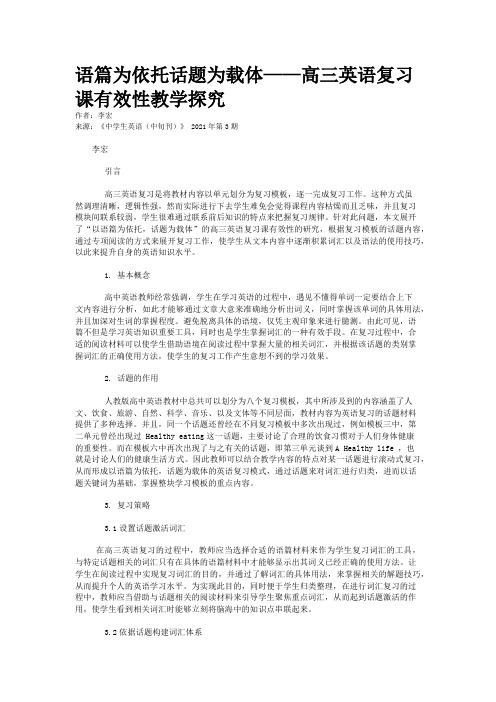
语篇为依托话题为载体——高三英语复习课有效性教学探究作者:李宏来源:《中学生英语(中旬刊)》 2021年第3期李宏引言高三英语复习是将教材内容以单元划分为复习模板,逐一完成复习工作。
这种方式虽然调理清晰,逻辑性强,然而实际进行下去学生难免会觉得课程内容枯燥而且乏味,并且复习模块间联系较弱,学生很难通过联系前后知识的特点来把握复习规律。
针对此问题,本文展开了“以语篇为依托,话题为载体”的高三英语复习课有效性的研究,根据复习模板的话题内容,通过专项阅读的方式来展开复习工作,使学生从文本内容中逐渐积累词汇以及语法的使用技巧,以此来提升自身的英语知识水平。
1. 基本概念高中英语教师经常强调,学生在学习英语的过程中,遇见不懂得单词一定要结合上下文内容进行分析,如此才能够通过文章大意来准确地分析出词义,同时掌握该单词的具体用法,并且加深对生词的掌握程度。
避免脱离具体的语境,仅凭主观印象来进行臆测。
由此可见,语篇不但是学习英语知识重要工具,同时也是学生掌握词汇的一种有效手段。
在复习过程中,合适的阅读材料可以使学生借助语境在阅读过程中掌握大量的相关词汇,并根据该话题的类别掌握词汇的正确使用方法,使学生的复习工作产生意想不到的学习效果。
2. 话题的作用人教版高中英语教材中总共可以划分为八个复习模板,其中所涉及到的内容涵盖了人文、饮食、旅游、自然、科学、音乐、以及文体等不同层面,教材内容为英语复习的话题材料提供了多种选择。
并且,同一个话题还曾经在不同复习模板中多次出现过,例如模板三中,第二单元曾经出现过 Healthy eating这一话题,主要讨论了合理的饮食习惯对于人们身体健康的重要性。
而在模板六中再次出现了与之有关的话题,即第三单元谈到A Healthy life ,也就是讨论人们的健康生活方式。
因此教师可以结合教学内容的特点对某一话题进行滚动式复习,从而形成以语篇为依托,话题为载体的英语复习模式,通过话题来对词汇进行归类,进而以话题关键词为基础,掌握整块学习模板的重点内容。
基于培养语篇意识的高中英语阅读教学设计探析
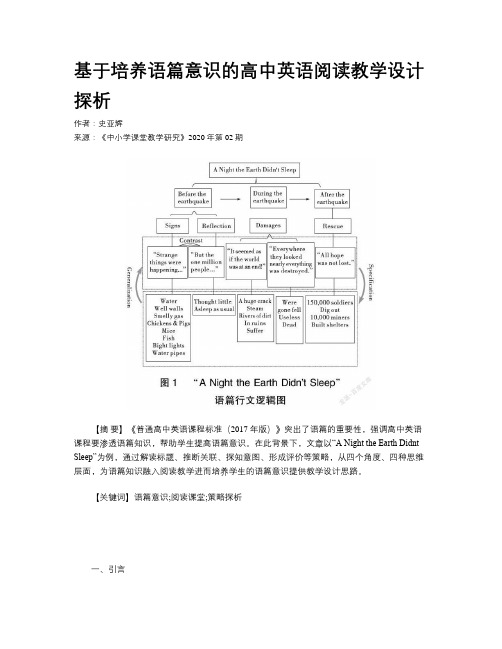
基于培养语篇意识的高中英语阅读教学设计探析作者:史亚辉来源:《中小学课堂教学研究》2020年第02期【摘要】《普通高中英语课程标准(2017年版)》突出了语篇的重要性,强调高中英语课程要渗透语篇知识,帮助学生提高语篇意识。
在此背景下,文章以“A Night the Earth Didnt Sleep”为例,通过解读标题、推断关联、探知意图、形成评价等策略,从四个角度、四种思维层面,为语篇知识融入阅读教学进而培养学生的语篇意识提供教学设计思路。
【关键词】语篇意识;阅读课堂;策略探析一、引言《普通高中英语课程标准(2017年版)》(以下简称《课标》)强调,普通高中英语课程要“发展英语学科核心素养,落实立德树人根本任务”[1]2。
英语学科核心素养以英语课程内容为基础,包括主题语境、语篇类型、语言知识、文化知识、语言技能和学习策略六个要素。
六个要素相互联系,构成一个有机整体。
所有的语言学习都应该在此整体中进行。
其中,语言知识不仅包括语音、词汇等知识,还包括语篇和语用的知识。
语言教学不是单一技能的讲解活动,而是依托于一定的语篇,对学生综合语言运用能力的培养。
《课标》指出,“学习语篇知识是发展语言运用能力的基础”[1]27。
因此,在教学活动中,有意识地培养学生的语篇意识是促进学生英语学科核心素养发展的必要条件。
笔者通过课堂观摩和自身的教学发现,由于教师鲜有接受过语篇知识的系统培训,在实际的课堂教学中很难全面地引导学生对所学文本进行语篇分析,导致从语篇角度出发培养学生的语篇意识尚不能成为教学常态[2]。
基于此,笔者希望通过理论分析进一步阐明语篇知识对英语教学的重要意义,并结合人教版高中英语必修一第四单元“A Night the Earth Didnt Sleep”一课,探析在阅读课上培养学生语篇意识的策略和方法,以期能为填补理论和现实之间的差距提供借鉴,做出贡献。
二、英语阅读教学中培养语篇意识的教学构思阅读最基本的功能在于传递信息。
浅谈高中英语议论文的写作中的篇章结构

浅谈高中英语议论文的写作中的篇章结构作者:陈珠英来源:《读与写·下旬刊》2015年第09期中图分类号:G633.4 文献标识码:B 文章编号:1672-1578(2015)09-0127-02高中英语议论文的写作,大多有具体要点(即论点或论据)的限定,所以并不需要如何地纵横捭阖,如何地旁征博引。
但是,麻雀虽小,五脏俱全,一篇100来字的议论文,同样必须逻辑严密,结构清晰,语言洗练,必须论有中心,言而有据。
以下笔者试从篇章结构来分析一下写好一篇小议论文的基本方法和技巧。
1.先有规矩,然后才能从心所欲,不逾矩议论文的写作,住往从正反两方面来论述,且都有其约定俗成的议论模式,即从"主题句一正面论述,反面论述一结论"四大块去营造文章的基本结构(四块论)。
例如,某题目要求论述"学校规定'课间学生只能呆在自己的教室里'对吗?"这一话题。
如果作者认为学校的规定不对,他就应该在文章第一块(段)亮出自己的观点:There is currently much discussion about whether students should stay in their own classrooms or not during break times.Personally I believe that-.而第二块应该从正面论述"课间不能只呆在自己的教室里"的理由。
比如可以说:I would argue that break times are our only opportunity to choose what we want to do. 第三块则从反面观点,即"课间只能呆在自己的教室里"出发,批驳对方观点或进一步阐述己方观点。
例如可以说:Another reason why people say that students have to stay in their own classes at break times is that it would be difficult to organize dinners。
高中英语12年级空中课堂—基于语篇的词汇衔接(上)

➢ 3.Most pharmacies rely on computer setups that are supposed to be updated regularly with information about new drugs or new risks for existing drugs…
高三年级英语学科
基于语篇的词汇衔接
1
目录
2
CONTENTS
3
4
词汇衔接概述 词汇衔接的分类
段内词汇衔接 段间词汇衔接
01 词汇衔接概述
我们在阅读时的困惑
➢ 文章生词较多 ➢ 话题陌生(尤其是说明文和议论文) ➢ 很难抓住作者想要表达的内容 ➢ 语篇怎么读也读不进去
词汇衔接概述
组织和连贯 语义选择和重组
Hale Waihona Puke 汇衔接的分类➢ I could see the walls, carpets and curtains. It was a parlour. ➢ 3.局部-整体关系
➢ The great ship, Titanic sailed for New York from Southampton on April 10, 1912. She was carrying 1316 passengers and a crew of 891.
life. 概括词复现
➢ 2.It must be realized that sport in its modern form is almost entirely a British invention. Boxing ,association football, tennis and cricket were all first organized
语篇分析教学视角下高中英语教学策略探究

龙源期刊网 语篇分析教学视角下高中英语教学策略探究作者:袁全球来源:《校园英语·月末》2018年第11期从语篇分析入手开展高中英语教学不仅有利于促进学生对篇章的整理把握,还能够帮助学生在阅读的过程中克服生词障碍,同时对于引导学生形成英语思维,掌握相应的人文知识,提升整体英语素养都是十分有益的。
只有提升教师和学生对语篇分析价值的认知,才能为教学提供语篇分析的有效策略。
一、高中英语教学中的语篇分析价值探索语篇分析这一概念于1952年由美国语言学家Zelling Harris提出,随着这一理论的不断丰富,语篇分析的内容逐渐丰富为衔接手段、语义关联以及影响意连的因素等。
而语篇分析又与语境、结构、策略等方面有着密切的联系。
从英语语言的角度来看,词汇、短语、句子、段落、语篇,其内部是存在一定关系的,如果说词汇、语法是从微观对英语进行的教学讲解,那么语篇分析则是从宏观的角度为学生的英语学习提供了一个全新的视角。
从语篇分析入手展开高中英语教学具有如下优势:首先,以语篇分析为途径的高中英语教学更有助于学生克服阅读障碍,学生在阅读中最恐惧的不是阅读材料中的语法过于复杂,而是担心生词太多。
一旦生词过多,就容易影响学生阅读的心态,而学生阅读和理解的效果也会受到极大的影响。
而实际上,即使是对于英语母语者来说在进行材料阅读时也是会遇到生词的,但为什么对于母语者来说,即使遇到生词较多的材料,也能够相对准确地把握阅读材料的内容呢?正是由于母语者更擅长从整体把握材料的大意,再结合上下分的信息便可“猜出”生词的大概含义或是可以自动“屏蔽”生词对阅读理解度障碍性影响。
因此从语篇分析的角度开展英语教学,有助于学生树立“母语者自信”,克服阅读障碍,更好地理解和把握阅读材料。
其次,从语篇分析入手开展高中英语教学更有助于学生英语思维的培养和英语人文素养的提升,在英语教学过程中,促进学生素养形成,不仅要引导学生提高英语语言表达能力,英语语言运用能力,更应该带领学生去体会英语文化,感受英语思维以及引导学生掌握基本的跨文化交际能力,而这些能力与素养就需要教师引导学生从语篇的整体入手进行提升。
- 1、下载文档前请自行甄别文档内容的完整性,平台不提供额外的编辑、内容补充、找答案等附加服务。
- 2、"仅部分预览"的文档,不可在线预览部分如存在完整性等问题,可反馈申请退款(可完整预览的文档不适用该条件!)。
- 3、如文档侵犯您的权益,请联系客服反馈,我们会尽快为您处理(人工客服工作时间:9:00-18:30)。
2020年北京市适应性测试D篇
⑤Does this process ever go wrong? Of course. Scientists are humans. There is always the possibility of revising a claim on the basis of new evidence. Some people argue that we should not trust science because scientists are “always changing their minds.” While examples of truly settled science being overturned are far fewer than is sometimes claimed, they do exist. But the beauty of this scientific process is that it explains what might otherwise appear paradoxical (矛盾的): that science produces both novelty and stability. Scientists do change their minds in the face of new evidence, but this is a strength of science, not a weakness.
②Stressing successes isn't wrong, but for many people it's not persuasive. An alternative answer to the question “Why trust science?” is that scientists use the so-called scientific method. If you've got a high school science textbook lying around, you'll probably find that answer in it. But what is typically thought to be the scientific method—develop a hypothesis (假设), then design an experiment to test it—isn't what scientists actually do. Science is dynamic: new methods get invented; old ones get abandoned; and sometimes, scientists can be found doing many different things.
2020年北京市适应性测试D篇
①For several decades, there has been an extensive and organized campaign intended to generate distrust in science, funded by those whose interests and ideologies are threatened by the findings of modern science. In response, scientists have tended to stress the success of science. After all, scientists have been right about most things.
④A key aspect of scientific judgment is that it is done collectively. No claim gets accepted until it has been vetted by dozens, if not hundreds, of heads. In areas that have been contested, like climate science and vaccine safety, it's thousands. This is why we are generally justified in not worrying too much if a single scientist, even a very famous one, disagrees with the claim. And this is why diversity in science—the more people looking at a claim from different angles—is important.
2020年北京市适应性测试D篇
③If there is no identifiable scientific method, then what is the reason for trust in science? The answer is how those claims are evaluated. The common element in modern science, regardless of the specific field or the particular methods being used, is the strict scrutiny (审查) of claims. It's this tough, sustained process that works to make sure faulty claims are rejected. A scientific claim is never accepted as true until it has gone through a lengthy “peer review” because the reviewers are experts in the same field who have both the right and the obligation (责任) to find faults.
高三年级英语学科
基于语篇的议论文篇章结构分析
1
目录
2
CONTENTS
3
4
语篇知识 解题思路 典型语篇 巩固提升
01 语篇知识
语篇知识内容要求
1. 如何构成?
句子、句群、段落
显连 性贯 2. 如何表达意义? 衔 手 接段
微观组织结构 宏观组织结构
3. 如何运用? 语义逻辑关系
议论文常见语篇结构
·Introduction ·Central Point /Thesis Statement ·Points 1, 2, 3... ·Evidence
·Conclusion
02 解题思路
2020年北京市适应性测试D篇
①For several decades, there has been an extensive and organized campaign intended to generate distrust in science, funded by those whose interests and ideologies are threatened by the findings of modern science. In response, scientists have tended to stress the success of science. After all, scientists have been right about most things.
⑤Does this process ever go wrong? Of course. Scientists are humans. There is always the possibility of revising a claim on the basis of new evidence. Some people argue that we should not trust science because scientists are “always changing their minds.” While examples of truly settled science being overturned are far fewer than is sometimes claimed, they do exist. But the beauty of this scientific process is that it explains what might otherwise appear paradoxical (矛盾的): that science produces both novelty and stability. Scientists do change their minds in the face of new evidence, but this is a strength of science, not a weakness.
2020年北京市适应性测试D篇
②Stressing successes isn't wrong, but for many people it's not persuasive. An alternative answer to the question “Why trust science?” is that scientists use the so-called scientific method. If you've got a high school science textbook lying around, you'll probably find that answer in it. But what is typically thought to be the scientific method—develop a hypothesis (假 设), then design an experiment to test it—isn't what scientists actually do. Science is dynamic: new methods get invented; old ones get abandoned; and sometimes, scientists can be found doing many different things.
